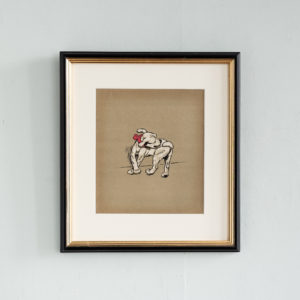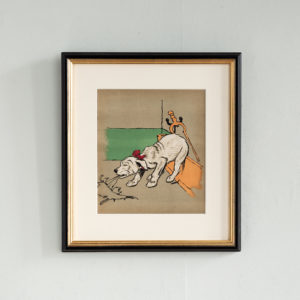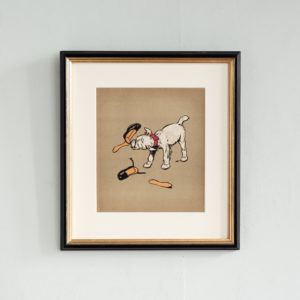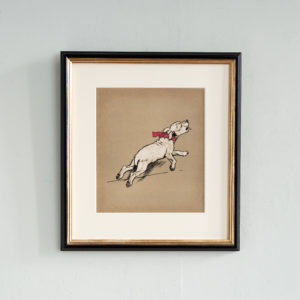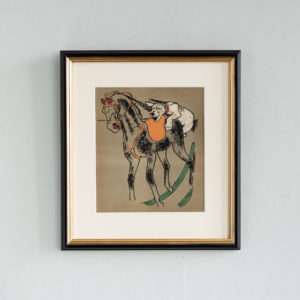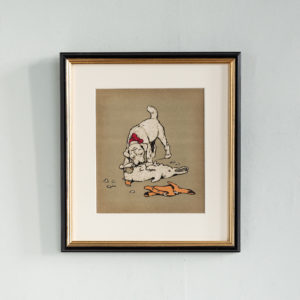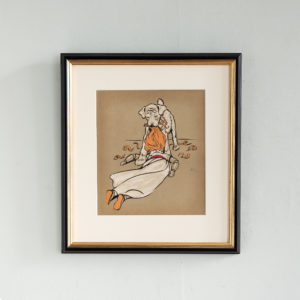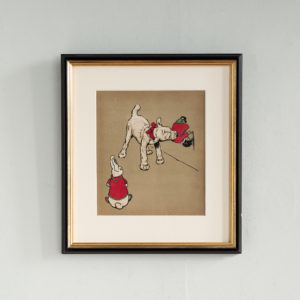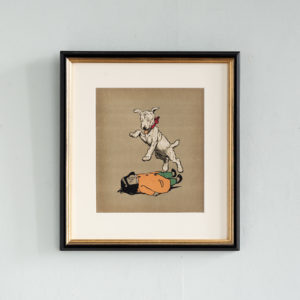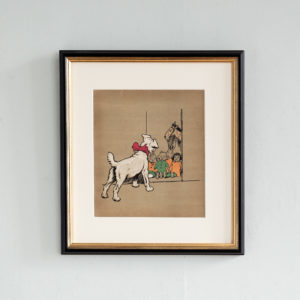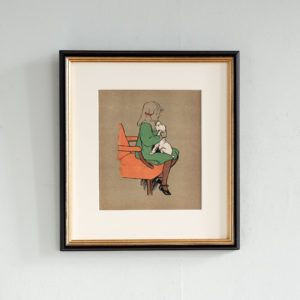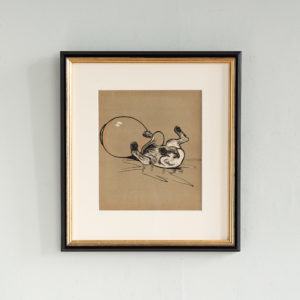821 items found
Page 3 of 9
-
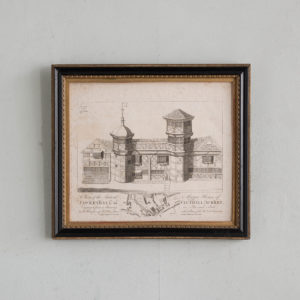
View of the Antient Manor House of Fawkeshall
£280View of the Antient Manor House of Fawkeshall
Historical engraving featuring a map of the area. Presented in a Hogarth pattern frame.£280 -
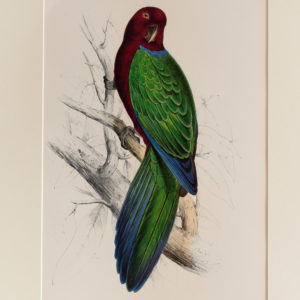
Parrots by Edward Lear – Tabuan Parrakeet,
£275Parrots by Edward Lear – Tabuan Parrakeet,
Edward Lear began his career as a zoological illustrator, working in the Parrot House at London Zoo. This resulted in the publication of Illustrations of the family of Psittacidae, or parrots, the greater part of them species hitherto unfigured in 1832. The first plates for the book were issued in 1830 when he was still only 18.£275 -
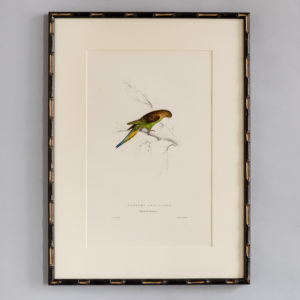
Parrots by Edward Lear – Undulated Parrakeet,
£275Parrots by Edward Lear – Undulated Parrakeet,
Edward Lear began his career as a zoological illustrator, working in the Parrot House at London Zoo. This resulted in the publication of Illustrations of the family of Psittacidae, or parrots, the greater part of them species hitherto unfigured in 1832. The first plates for the book were issued in 1830 when he was still only 18.£275 -
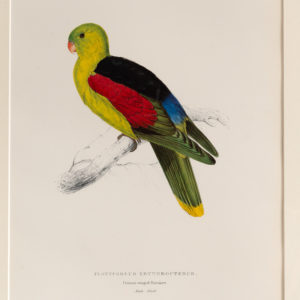
Parrots by Edward Lear – Crimson-winged Parrakeet,
£275Parrots by Edward Lear – Crimson-winged Parrakeet,
Edward Lear began his career as a zoological illustrator, working in the Parrot House at London Zoo. This resulted in the publication of Illustrations of the family of Psittacidae, or parrots, the greater part of them species hitherto unfigured in 1832. The first plates for the book were issued in 1830 when he was still only 18.£275 -
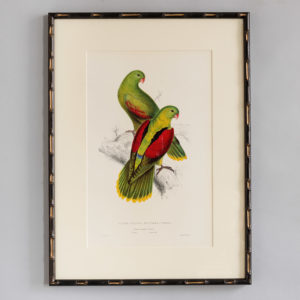
Parrots by Edward Lear – Crimson-winged Parrakeet,
£275Parrots by Edward Lear – Crimson-winged Parrakeet,
Edward Lear began his career as a zoological illustrator, working in the Parrot House at London Zoo. This resulted in the publication of Illustrations of the family of Psittacidae, or parrots, the greater part of them species hitherto unfigured in 1832. The first plates for the book were issued in 1830 when he was still only 18.£275 -
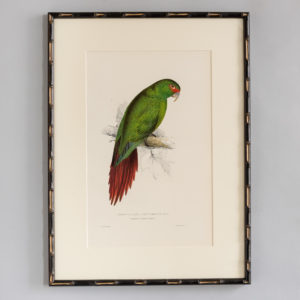
Parrots by Edward Lear – Long-billed Parrakeet-Maccaw,
£275Parrots by Edward Lear – Long-billed Parrakeet-Maccaw,
Edward Lear began his career as a zoological illustrator, working in the Parrot House at London Zoo. This resulted in the publication of Illustrations of the family of Psittacidae, or parrots, the greater part of them species hitherto unfigured in 1832. The first plates for the book were issued in 1830 when he was still only 18.£275 -
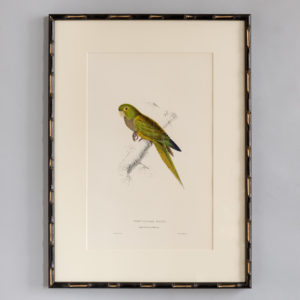
Parrots by Edward Lear – Dwarf Parrakeet Maccaw,
£275Parrots by Edward Lear – Dwarf Parrakeet Maccaw,
Edward Lear began his career as a zoological illustrator, working in the Parrot House at London Zoo. This resulted in the publication of Illustrations of the family of Psittacidae, or parrots, the greater part of them species hitherto unfigured in 1832. The first plates for the book were issued in 1830 when he was still only 18.£275 -
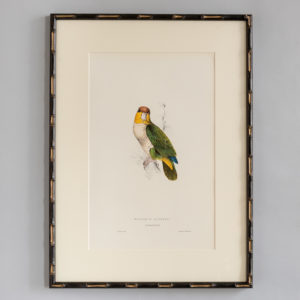
Parrots by Edward Lear – Bay-headed Parrot,
£275Parrots by Edward Lear – Bay-headed Parrot,
Edward Lear began his career as a zoological illustrator, working in the Parrot House at London Zoo. This resulted in the publication of Illustrations of the family of Psittacidae, or parrots, the greater part of them species hitherto unfigured in 1832. The first plates for the book were issued in 1830 when he was still only 18.£275 -
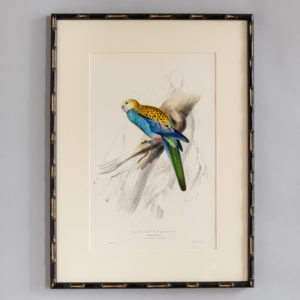
Parrots by Edward Lear – Paleheaded Parrakeet,
£275Parrots by Edward Lear – Paleheaded Parrakeet,
Edward Lear began his career as a zoological illustrator, working in the Parrot House at London Zoo. This resulted in the publication of Illustrations of the family of Psittacidae, or parrots, the greater part of them species hitherto unfigured in 1832. The first plates for the book were issued in 1830 when he was still only 18.£275 -
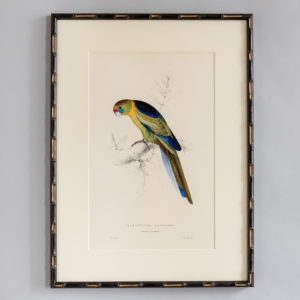
Parrots by Edward Lear – Barnard’s Parrakeet,
£275Parrots by Edward Lear – Barnard’s Parrakeet,
Edward Lear began his career as a zoological illustrator, working in the Parrot House at London Zoo. This resulted in the publication of Illustrations of the family of Psittacidae, or parrots, the greater part of them species hitherto unfigured in 1832. The first plates for the book were issued in 1830 when he was still only 18.£275 -
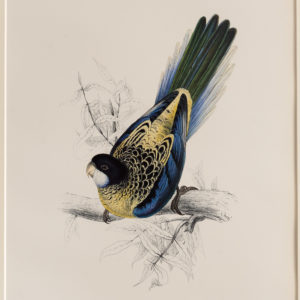
Parrots by Edward Lear – Brown’s Parrakeet,
£275Parrots by Edward Lear – Brown’s Parrakeet,
Edward Lear began his career as a zoological illustrator, working in the Parrot House at London Zoo. This resulted in the publication of Illustrations of the family of Psittacidae, or parrots, the greater part of them species hitherto unfigured in 1832. The first plates for the book were issued in 1830 when he was still only 18.£275 -
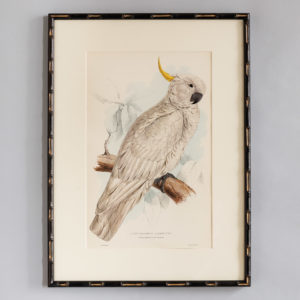
Parrots by Edward Lear – Greater Sulphur-crested Cockatoo,
£275Parrots by Edward Lear – Greater Sulphur-crested Cockatoo,
Edward Lear began his career as a zoological illustrator, working in the Parrot House at London Zoo. This resulted in the publication of Illustrations of the family of Psittacidae, or parrots, the greater part of them species hitherto unfigured in 1832. The first plates for the book were issued in 1830 when he was still only 18.£275 -
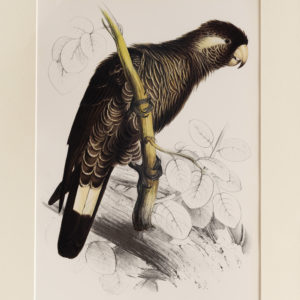
Parrots by Edward Lear – Baudin’s Cockatoo
£275Parrots by Edward Lear – Baudin’s Cockatoo
Edward Lear began his career as a zoological illustrator, working in the Parrot House at London Zoo. This resulted in the publication of Illustrations of the family of Psittacidae, or parrots, the greater part of them species hitherto unfigured in 1832. The first plates for the book were issued in 1830 when he was still only 18.£275 -
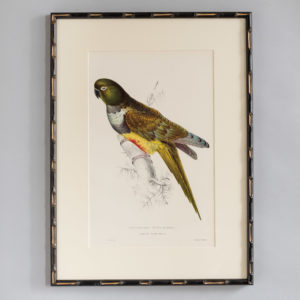
Parrots by Edward Lear – Patagonian Parrakeet-Maccaw
£275Parrots by Edward Lear – Patagonian Parrakeet-Maccaw
Edward Lear began his career as a zoological illustrator, working in the Parrot House at London Zoo. This resulted in the publication of Illustrations of the family of Psittacidae, or parrots, the greater part of them species hitherto unfigured in 1832. The first plates for the book were issued in 1830 when he was still only 18.£275 -
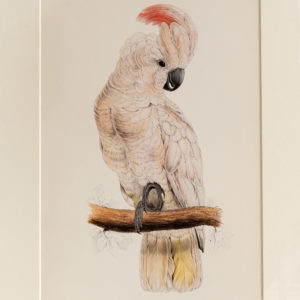
Parrots by Edward Lear – Salmon-crested Cockatoo
£275Parrots by Edward Lear – Salmon-crested Cockatoo
Edward Lear began his career as a zoological illustrator, working in the Parrot House at London Zoo. This resulted in the publication of Illustrations of the family of Psittacidae, or parrots, the greater part of them species hitherto unfigured in 1832. The first plates for the book were issued in 1830 when he was still only 18.£275 -
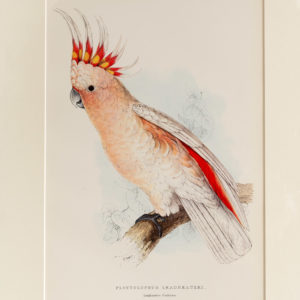
Parrots by Edward Lear – Leadbeater’s Cockatoo,
£275Parrots by Edward Lear – Leadbeater’s Cockatoo,
Edward Lear began his career as a zoological illustrator, working in the Parrot House at London Zoo. This resulted in the publication of Illustrations of the family of Psittacidae, or parrots, the greater part of them species hitherto unfigured in 1832. The first plates for the book were issued in 1830 when he was still only 18.£275 -

Sir Winston Churchill
£270Sir Winston Churchill
A framed, Mid 20th Century lithograph depicting Sir Winston Churchill in the manner of the controversial and now lost John Sutherland portrait of 1949.£270 -
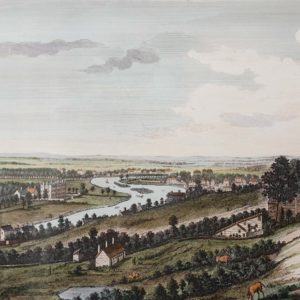
West View of Richmond from the Star & Garter
£270West View of Richmond from the Star & Garter
A framed and mounted, hand coloured engraving showing the Thames valley looking west over Richmond and Twickenham from a position besides the famous Star and Garter hotel at the top of Richmond Hill.£270 -
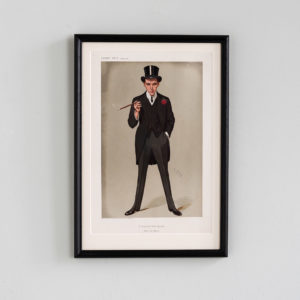
A Successful First Speech,
£270A Successful First Speech,
Framed chromolithograph by SPY (Sir Leslie Ward) picturing Mr Fredrick Edwin Smith, later 1st Earl of Birkenhead, MP for Liverpool Walton and boon companion of Sir Winston Churchill until his early death. The subtitle, 'Moab is my Washpot', is from psalm 108 and is a proverbial declaration of total triumph over vanquished foes. F.E Smith is famed in Parliamentary history for his maiden speech in the House, known as 'I Warn The Government', described by the late Paul Johnson as "without question the most famous maiden speech in history, quite unprecedented, and never equalled since." In it he accused the Liberal government of arrogance, dishonesty and heavy handedness after their landslide victory at the election of 1906. He managed to catch David Lloyd George in a clear untruth and won the begrudging admiration of all sides of the house. He declared, in response to a suggestion by Lloyd George to the churches of Wales that the Tories wanted to 'introduce slavery to the hills of Wales' that: "I have no means of judging how heaven will deal with persons who think it decent to make such suggestions. The distinction drawn by the Right Hon. Gentleman is more worthy of the county court than of the Treasury Bench." He then went on famously to declare: "I venture to warn the government that the people of this country will neither forget nor forgive a party which, in the heyday of its triumph, denies to the infant Parliament of the Empire one jot or tittle of that ancient liberty of speech which our predecessors in this House vindicated for themselves at the point of the sword." He was a, according to the ONDB a 'champion of hard-drinking patriotic men' in the face of the temperance movement before his early death of cirrhosis of the liver.£270 -
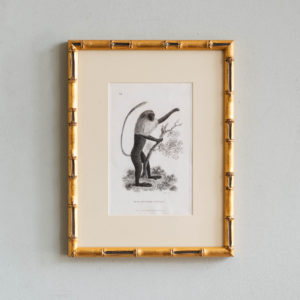
Monkeys – Full-Bottom Monkey,
£260 EachMonkeys – Full-Bottom Monkey,
The English Encyclopaedia was published in 1802 by George Kearsley and it gave an unusual insight into early 19th century new discoveries in zoology.£260 Each -
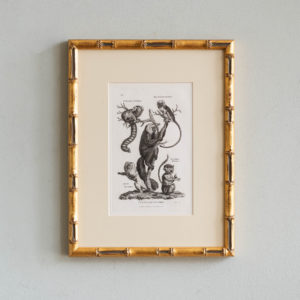
Monkeys – Striated Monkey, Red Tailed-Monkey,
£260 EachMonkeys – Striated Monkey, Red Tailed-Monkey,
The English Encyclopaedia was published in 1802 by George Kearsley and it gave an unusual insight into early 19th century new discoveries in zoology.£260 Each -
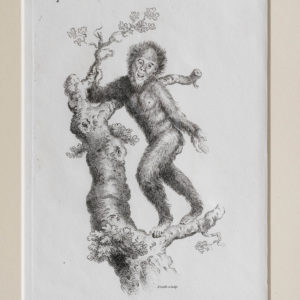
Monkeys – Oran Otan
£260 EachMonkeys – Oran Otan
The English Encyclopaedia was published in 1802 by George Kearsley and it gave an unusual insight into early 19th century new discoveries in zoology.£260 Each -
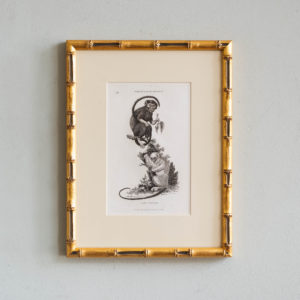
Monkeys – Great-Eared Monkey, and Fair Monkey,
£260 EachMonkeys – Great-Eared Monkey, and Fair Monkey,
The English Encyclopaedia was published in 1802 by George Kearsley and it gave an unusual insight into early 19th century new discoveries in zoology.£260 Each -
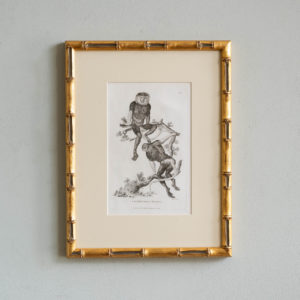
Monkeys – Cochinchina Monkey,
£260 EachMonkeys – Cochinchina Monkey,
The English Encyclopaedia was published in 1802 by George Kearsley and it gave an unusual insight into early 19th century new discoveries in zoology.£260 Each -
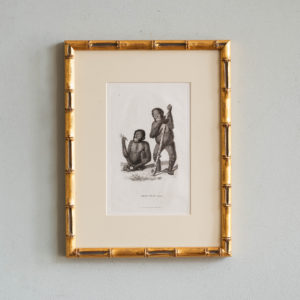
Monkeys – Oran Otan,
£260 EachMonkeys – Oran Otan,
The English Encyclopaedia was published in 1802 by George Kearsley and it gave an unusual insight into early 19th century new discoveries in zoology.£260 Each -
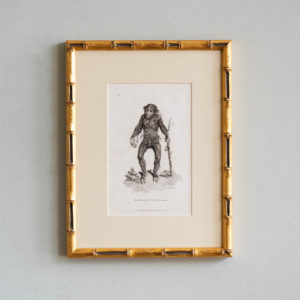
Monkeys – Black Oran-Otan,
£260 EachMonkeys – Black Oran-Otan,
The English Encyclopaedia was published in 1802 by George Kearsley and it gave an unusual insight into early 19th century new discoveries in zoology.£260 Each -
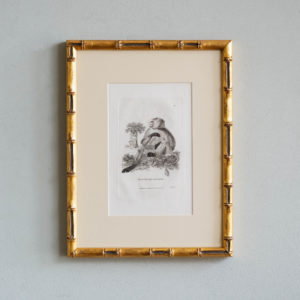
Monkeys – Dog-Faced Baboon,
£260 EachMonkeys – Dog-Faced Baboon,
The English Encyclopaedia was published in 1802 by George Kearsley and it gave an unusual insight into early 19th century new discoveries in zoology.£260 Each -
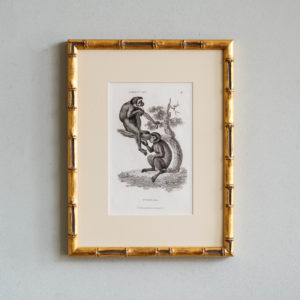
Monkeys – Pygmy Ape, and Alpinus Ape,
£260 EachMonkeys – Pygmy Ape, and Alpinus Ape,
The English Encyclopaedia was published in 1802 by George Kearsley and it gave an unusual insight into early 19th century new discoveries in zoology.£260 Each -
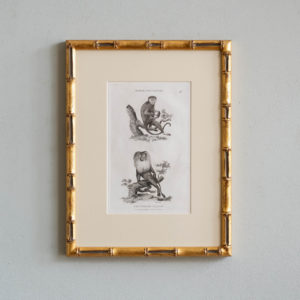
Monkeys – Hare-Lipped Monkey, and Lion-Tailed Monkey,
£260 EachMonkeys – Hare-Lipped Monkey, and Lion-Tailed Monkey,
The English Encyclopaedia was published in 1802 by George Kearsley and it gave an unusual insight into early 19th century new discoveries in zoology.£260 Each -
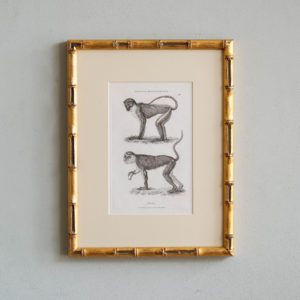
Monkeys – Spotted, or Diana Monkey and Mona,
£260 EachMonkeys – Spotted, or Diana Monkey and Mona,
The English Encyclopaedia was published in 1802 by George Kearsley and it gave an unusual insight into early 19th century new discoveries in zoology.£260 Each -
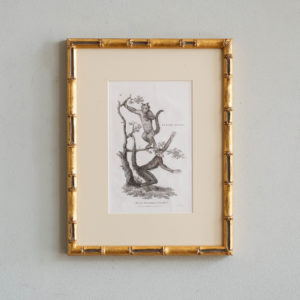
Monkeys – Horned Monkey and Four-Fingered Monkey
£260 EachMonkeys – Horned Monkey and Four-Fingered Monkey
The English Encyclopaedia was published in 1802 by George Kearsley and it gave an unusual insight into early 19th century new discoveries in zoology.£260 Each -
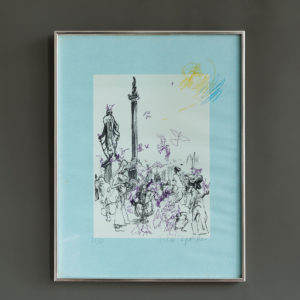
Feliks Topolski Trafalgar Square
£250Feliks Topolski Trafalgar Square
A framed Lithograph by the Anglo-Polish Expressionist artist Feliks Topolski RA showing view of Nelson's Column and Trafalgar Square.£250 -
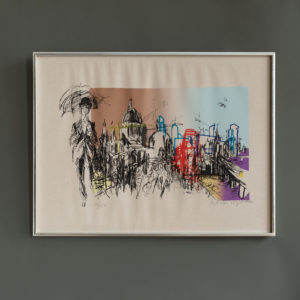
Feliks Topolski City
£250Feliks Topolski City
A framed Lithograph by the Anglo-Polish Expressionist artist Feliks Topolski RA showing view of the City of London seen from the South Bank of the Thames.£250 -
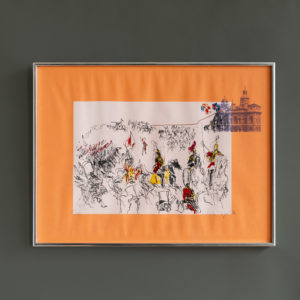
Feliks Topolski Trooping the Colour
£250Feliks Topolski Trooping the Colour
A framed Lithograph by the Anglo-Polish Expressionist artist Feliks Topolski RA showing the Trooping of the Colour at Horseguards Parade in London.£250 -
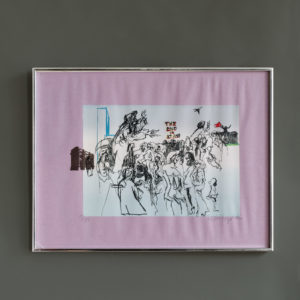
Feliks Topolski Speakers’ Corner
£250Feliks Topolski Speakers’ Corner
A framed Lithograph by the Anglo-Polish Expressionist artist Feliks Topolski RA showing a scene at Speakers Corner in London's Hyde Park.£250 -
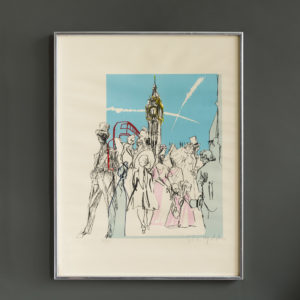
Feliks Topolski Westminster
£250Feliks Topolski Westminster
A framed Lithograph by the Anglo-Polish Expressionist artist Feliks Topolski RA showing a scene at Wesminster.£250 -
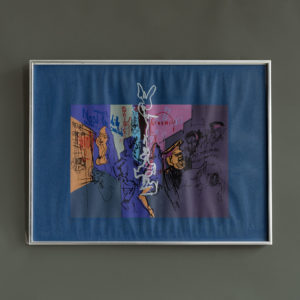
Feliks Topolski Piccadilly Circus
£250Feliks Topolski Piccadilly Circus
A framed Lithograph by the Anglo-Polish Expressionist artist Feliks Topolski RA showing a night scene at Picadilly Circus.£250 -
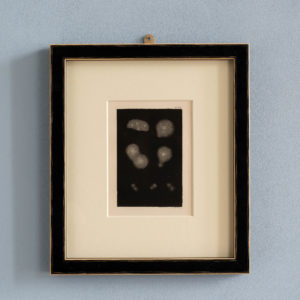
Views of the Architecture of the Heavens, by John Nichol
£250 eachViews of the Architecture of the Heavens, by John Nichol
John Pringle Nichol who, a Scottish Romantic astronomer, educator, and social reformer, who produced popular science books between 1846 and 1850. As the 5th Regius Professor of Astronomy at the University of Edinburgh , influenced the building of a large observatory beyond the city on Horselethill, paid for by the local citizens. In 1841, it was saved from financial collapse by the University. Part of the difficulties had arisen through Nichol's extravagance in purchasing unnecessarily expensive equipment. Eventually, Horselethill Observatory was kept in operation for 100 years. Nichol was a prolific writer and populariser of Astronomy; his books Contemplations on the Solar System and Views of the Architecture of the Heavens, the latter expanding on the Nebular Hypothesis, and one describing the discovery of Neptune£250 each -
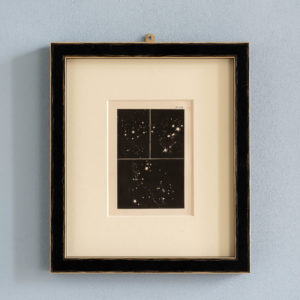
Views of the Architecture of the Heavens, by John Nichol
£250 eachViews of the Architecture of the Heavens, by John Nichol
John Pringle Nichol who, a Scottish Romantic astronomer, educator, and social reformer, who produced popular science books between 1846 and 1850. As the 5th Regius Professor of Astronomy at the University of Edinburgh , influenced the building of a large observatory beyond the city on Horselethill, paid for by the local citizens. In 1841, it was saved from financial collapse by the University. Part of the difficulties had arisen through Nichol's extravagance in purchasing unnecessarily expensive equipment. Eventually, Horselethill Observatory was kept in operation for 100 years. Nichol was a prolific writer and populariser of Astronomy; his books Contemplations on the Solar System and Views of the Architecture of the Heavens, the latter expanding on the Nebular Hypothesis, and one describing the discovery of Neptune£250 each -
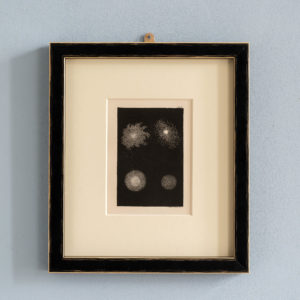
Views of the Architecture of the Heavens, by John Nichol
£250 eachViews of the Architecture of the Heavens, by John Nichol
John Pringle Nichol who, a Scottish Romantic astronomer, educator, and social reformer, who produced popular science books between 1846 and 1850. As the 5th Regius Professor of Astronomy at the University of Edinburgh , influenced the building of a large observatory beyond the city on Horselethill, paid for by the local citizens. In 1841, it was saved from financial collapse by the University. Part of the difficulties had arisen through Nichol's extravagance in purchasing unnecessarily expensive equipment. Eventually, Horselethill Observatory was kept in operation for 100 years. Nichol was a prolific writer and populariser of Astronomy; his books Contemplations on the Solar System and Views of the Architecture of the Heavens, the latter expanding on the Nebular Hypothesis, and one describing the discovery of Neptune£250 each -
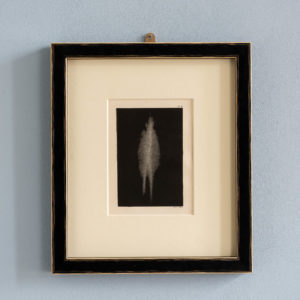
Views of the Architecture of the Heavens, by John Nichol
£250 eachViews of the Architecture of the Heavens, by John Nichol
John Pringle Nichol who, a Scottish Romantic astronomer, educator, and social reformer, who produced popular science books between 1846 and 1850. As the 5th Regius Professor of Astronomy at the University of Edinburgh , influenced the building of a large observatory beyond the city on Horselethill, paid for by the local citizens. In 1841, it was saved from financial collapse by the University. Part of the difficulties had arisen through Nichol's extravagance in purchasing unnecessarily expensive equipment. Eventually, Horselethill Observatory was kept in operation for 100 years. Nichol was a prolific writer and populariser of Astronomy; his books Contemplations on the Solar System and Views of the Architecture of the Heavens, the latter expanding on the Nebular Hypothesis, and one describing the discovery of Neptune£250 each -
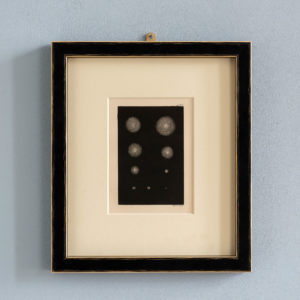
Views of the Architecture of the Heavens, by John Nichol
£250 eachViews of the Architecture of the Heavens, by John Nichol
John Pringle Nichol who, a Scottish Romantic astronomer, educator, and social reformer, who produced popular science books between 1846 and 1850. As the 5th Regius Professor of Astronomy at the University of Edinburgh , influenced the building of a large observatory beyond the city on Horselethill, paid for by the local citizens. In 1841, it was saved from financial collapse by the University. Part of the difficulties had arisen through Nichol's extravagance in purchasing unnecessarily expensive equipment. Eventually, Horselethill Observatory was kept in operation for 100 years. Nichol was a prolific writer and populariser of Astronomy; his books Contemplations on the Solar System and Views of the Architecture of the Heavens, the latter expanding on the Nebular Hypothesis, and one describing the discovery of Neptune£250 each -
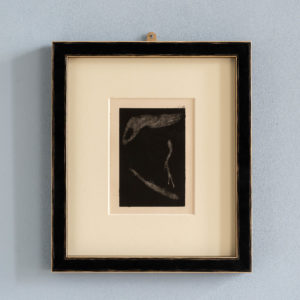
Views of the Architecture of the Heavens, by John Nichol
£250 eachViews of the Architecture of the Heavens, by John Nichol
John Pringle Nichol who, a Scottish Romantic astronomer, educator, and social reformer, who produced popular science books between 1846 and 1850. As the 5th Regius Professor of Astronomy at the University of Edinburgh , influenced the building of a large observatory beyond the city on Horselethill, paid for by the local citizens. In 1841, it was saved from financial collapse by the University. Part of the difficulties had arisen through Nichol's extravagance in purchasing unnecessarily expensive equipment. Eventually, Horselethill Observatory was kept in operation for 100 years. Nichol was a prolific writer and populariser of Astronomy; his books Contemplations on the Solar System and Views of the Architecture of the Heavens, the latter expanding on the Nebular Hypothesis, and one describing the discovery of Neptune£250 each -
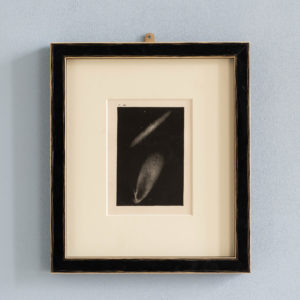
Views of the Architecture of the Heavens, by John Nichol
£250 eachViews of the Architecture of the Heavens, by John Nichol
John Pringle Nichol who, a Scottish Romantic astronomer, educator, and social reformer, who produced popular science books between 1846 and 1850. As the 5th Regius Professor of Astronomy at the University of Edinburgh , influenced the building of a large observatory beyond the city on Horselethill, paid for by the local citizens. In 1841, it was saved from financial collapse by the University. Part of the difficulties had arisen through Nichol's extravagance in purchasing unnecessarily expensive equipment. Eventually, Horselethill Observatory was kept in operation for 100 years. Nichol was a prolific writer and populariser of Astronomy; his books Contemplations on the Solar System and Views of the Architecture of the Heavens, the latter expanding on the Nebular Hypothesis, and one describing the discovery of Neptune£250 each -
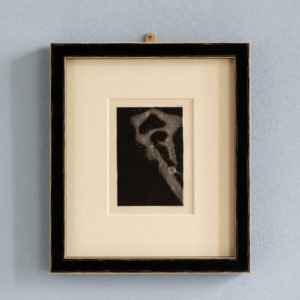
Views of the Architecture of the Heavens, by John Nichol
£250 eachViews of the Architecture of the Heavens, by John Nichol
John Pringle Nichol who, a Scottish Romantic astronomer, educator, and social reformer, who produced popular science books between 1846 and 1850. As the 5th Regius Professor of Astronomy at the University of Edinburgh , influenced the building of a large observatory beyond the city on Horselethill, paid for by the local citizens. In 1841, it was saved from financial collapse by the University. Part of the difficulties had arisen through Nichol's extravagance in purchasing unnecessarily expensive equipment. Eventually, Horselethill Observatory was kept in operation for 100 years. Nichol was a prolific writer and populariser of Astronomy; his books Contemplations on the Solar System and Views of the Architecture of the Heavens, the latter expanding on the Nebular Hypothesis, and one describing the discovery of Neptune£250 each -
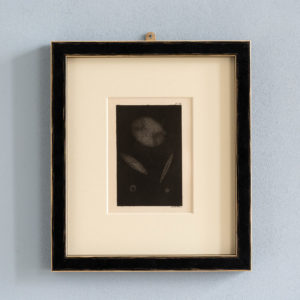
Views of the Architecture of the Heavens, by John Nichol
£250 eachViews of the Architecture of the Heavens, by John Nichol
John Pringle Nichol who, a Scottish Romantic astronomer, educator, and social reformer, who produced popular science books between 1846 and 1850. As the 5th Regius Professor of Astronomy at the University of Edinburgh , influenced the building of a large observatory beyond the city on Horselethill, paid for by the local citizens. In 1841, it was saved from financial collapse by the University. Part of the difficulties had arisen through Nichol's extravagance in purchasing unnecessarily expensive equipment. Eventually, Horselethill Observatory was kept in operation for 100 years. Nichol was a prolific writer and populariser of Astronomy; his books Contemplations on the Solar System and Views of the Architecture of the Heavens, the latter expanding on the Nebular Hypothesis, and one describing the discovery of Neptune£250 each -
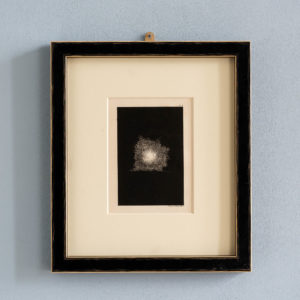
Views of the Architecture of the Heavens, by John Nichol
£250 eachViews of the Architecture of the Heavens, by John Nichol
John Pringle Nichol who, a Scottish Romantic astronomer, educator, and social reformer, who produced popular science books between 1846 and 1850. As the 5th Regius Professor of Astronomy at the University of Edinburgh , influenced the building of a large observatory beyond the city on Horselethill, paid for by the local citizens. In 1841, it was saved from financial collapse by the University. Part of the difficulties had arisen through Nichol's extravagance in purchasing unnecessarily expensive equipment. Eventually, Horselethill Observatory was kept in operation for 100 years. Nichol was a prolific writer and populariser of Astronomy; his books Contemplations on the Solar System and Views of the Architecture of the Heavens, the latter expanding on the Nebular Hypothesis, and one describing the discovery of Neptune£250 each -
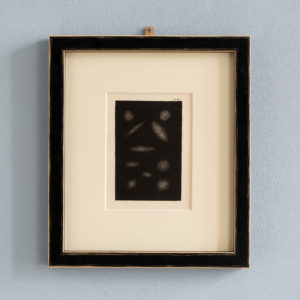
Views of the Architecture of the Heavens, by John Nichol
£250 eachViews of the Architecture of the Heavens, by John Nichol
John Pringle Nichol who, a Scottish Romantic astronomer, educator, and social reformer, who produced popular science books between 1846 and 1850. As the 5th Regius Professor of Astronomy at the University of Edinburgh , influenced the building of a large observatory beyond the city on Horselethill, paid for by the local citizens. In 1841, it was saved from financial collapse by the University. Part of the difficulties had arisen through Nichol's extravagance in purchasing unnecessarily expensive equipment. Eventually, Horselethill Observatory was kept in operation for 100 years. Nichol was a prolific writer and populariser of Astronomy; his books Contemplations on the Solar System and Views of the Architecture of the Heavens, the latter expanding on the Nebular Hypothesis, and one describing the discovery of Neptune£250 each -
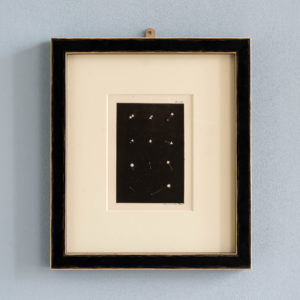
Views of the Architecture of the Heavens, by John Nichol
£250 eachViews of the Architecture of the Heavens, by John Nichol
John Pringle Nichol who, a Scottish Romantic astronomer, educator, and social reformer, who produced popular science books between 1846 and 1850. As the 5th Regius Professor of Astronomy at the University of Edinburgh , influenced the building of a large observatory beyond the city on Horselethill, paid for by the local citizens. In 1841, it was saved from financial collapse by the University. Part of the difficulties had arisen through Nichol's extravagance in purchasing unnecessarily expensive equipment. Eventually, Horselethill Observatory was kept in operation for 100 years. Nichol was a prolific writer and populariser of Astronomy; his books Contemplations on the Solar System and Views of the Architecture of the Heavens, the latter expanding on the Nebular Hypothesis, and one describing the discovery of Neptune£250 each -

Views of the Architecture of the Heavens, by John Nichol
£250 eachViews of the Architecture of the Heavens, by John Nichol
John Pringle Nichol who, a Scottish Romantic astronomer, educator, and social reformer, who produced popular science books between 1846 and 1850. As the 5th Regius Professor of Astronomy at the University of Edinburgh , influenced the building of a large observatory beyond the city on Horselethill, paid for by the local citizens. In 1841, it was saved from financial collapse by the University. Part of the difficulties had arisen through Nichol's extravagance in purchasing unnecessarily expensive equipment. Eventually, Horselethill Observatory was kept in operation for 100 years. Nichol was a prolific writer and populariser of Astronomy; his books Contemplations on the Solar System and Views of the Architecture of the Heavens, the latter expanding on the Nebular Hypothesis, and one describing the discovery of Neptune£250 each -
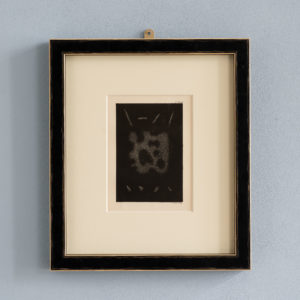
Views of the Architecture of the Heavens, by John Nichol
£250 eachViews of the Architecture of the Heavens, by John Nichol
John Pringle Nichol who, a Scottish Romantic astronomer, educator, and social reformer, who produced popular science books between 1846 and 1850. As the 5th Regius Professor of Astronomy at the University of Edinburgh , influenced the building of a large observatory beyond the city on Horselethill, paid for by the local citizens. In 1841, it was saved from financial collapse by the University. Part of the difficulties had arisen through Nichol's extravagance in purchasing unnecessarily expensive equipment. Eventually, Horselethill Observatory was kept in operation for 100 years. Nichol was a prolific writer and populariser of Astronomy; his books Contemplations on the Solar System and Views of the Architecture of the Heavens, the latter expanding on the Nebular Hypothesis, and one describing the discovery of Neptune£250 each -
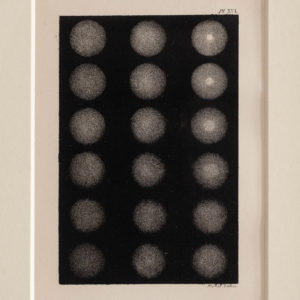
Views of the Architecture of the Heavens, by John Nichol
£250 eachViews of the Architecture of the Heavens, by John Nichol
John Pringle Nichol who, a Scottish Romantic astronomer, educator, and social reformer, who produced popular science books between 1846 and 1850. As the 5th Regius Professor of Astronomy at the University of Edinburgh , influenced the building of a large observatory beyond the city on Horselethill, paid for by the local citizens. In 1841, it was saved from financial collapse by the University. Part of the difficulties had arisen through Nichol's extravagance in purchasing unnecessarily expensive equipment. Eventually, Horselethill Observatory was kept in operation for 100 years. Nichol was a prolific writer and populariser of Astronomy; his books Contemplations on the Solar System and Views of the Architecture of the Heavens, the latter expanding on the Nebular Hypothesis, and one describing the discovery of Neptune£250 each -

Views of the Architecture of the Heavens, by John Nichol
£250 eachViews of the Architecture of the Heavens, by John Nichol
John Pringle Nichol who, a Scottish Romantic astronomer, educator, and social reformer, who produced popular science books between 1846 and 1850. As the 5th Regius Professor of Astronomy at the University of Edinburgh , influenced the building of a large observatory beyond the city on Horselethill, paid for by the local citizens. In 1841, it was saved from financial collapse by the University. Part of the difficulties had arisen through Nichol's extravagance in purchasing unnecessarily expensive equipment. Eventually, Horselethill Observatory was kept in operation for 100 years. Nichol was a prolific writer and populariser of Astronomy; his books Contemplations on the Solar System and Views of the Architecture of the Heavens, the latter expanding on the Nebular Hypothesis, and one describing the discovery of Neptune£250 each -
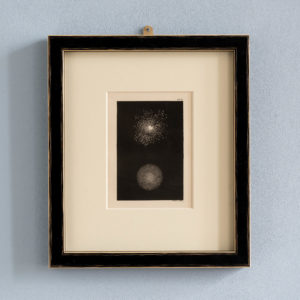
Views of the Architecture of the Heavens, by John Nichol
£250 eachViews of the Architecture of the Heavens, by John Nichol
John Pringle Nichol who, a Scottish Romantic astronomer, educator, and social reformer, who produced popular science books between 1846 and 1850. As the 5th Regius Professor of Astronomy at the University of Edinburgh , influenced the building of a large observatory beyond the city on Horselethill, paid for by the local citizens. In 1841, it was saved from financial collapse by the University. Part of the difficulties had arisen through Nichol's extravagance in purchasing unnecessarily expensive equipment. Eventually, Horselethill Observatory was kept in operation for 100 years. Nichol was a prolific writer and populariser of Astronomy; his books Contemplations on the Solar System and Views of the Architecture of the Heavens, the latter expanding on the Nebular Hypothesis, and one describing the discovery of Neptune£250 each -
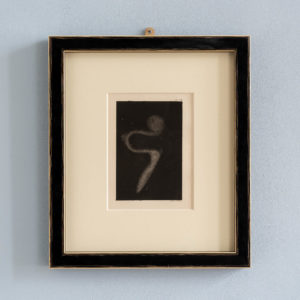
Views of the Architecture of the Heavens, by John Nichol
£250 eachViews of the Architecture of the Heavens, by John Nichol
John Pringle Nichol who, a Scottish Romantic astronomer, educator, and social reformer, who produced popular science books between 1846 and 1850. As the 5th Regius Professor of Astronomy at the University of Edinburgh , influenced the building of a large observatory beyond the city on Horselethill, paid for by the local citizens. In 1841, it was saved from financial collapse by the University. Part of the difficulties had arisen through Nichol's extravagance in purchasing unnecessarily expensive equipment. Eventually, Horselethill Observatory was kept in operation for 100 years. Nichol was a prolific writer and populariser of Astronomy; his books Contemplations on the Solar System and Views of the Architecture of the Heavens, the latter expanding on the Nebular Hypothesis, and one describing the discovery of Neptune£250 each -
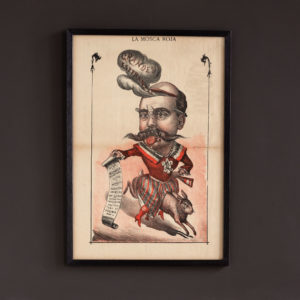
La Mosca Roja, Spanish political poster.
£250La Mosca Roja, Spanish political poster.
A framed Spanish political poster depicting a moustachoied figure, possibly Fransisco Serrano, 1st Duke of La Torre. He is shown dressed in harlequinade and mounted on a white hare proffering a scroll of reactionary and traditionalist demands while dark smoke, containing 'grand hopes' escapes from a breach in his skull. Cannons point out from behind his ears and The Pope is secreted between his eyes. Printed in Barcelona in the 1880s.£250 -
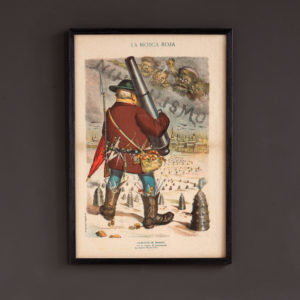
La Mosca Roja, ‘La Caminito de Moscou’
£250La Mosca Roja, ‘La Caminito de Moscou’
A framed chromolithographic Spanish political cartoon of the 1880s showing a heavily armed figure walking through a minefield towards the domes and towers of the Moscow Kremlin with a bag of Seville oranges on his hip. A cloud of disembodied demonic heads are ranged in a wintry sky while the word 'Nihilism' is written in smoke across the heavens. In 1881 Tsar Alexander II had been assassinated in St Petersburg by the Revolutionary Socialist and Nihilist secret society, Zemlya i volya.£250 -
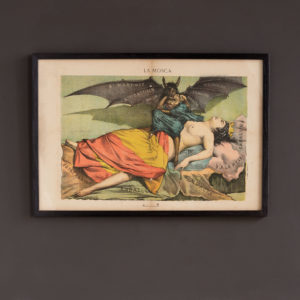
La Mosca
£250La Mosca
A framed Spanish political poster depicting a crowned female figure, draped in the flag of Spain, loomed over by a demonic ghoul.£250 -
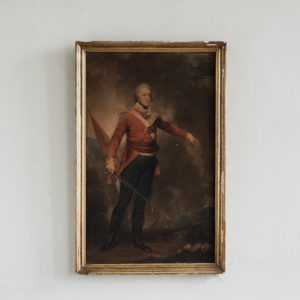
General The Earl of Mulgrave,
£250General The Earl of Mulgrave,
A hand coloured, framed mezzotint of Henry Phipps, the 1st Earl of Mulgrave after an original painting by John Hoppner. Baron (later Earl) Mulgrave served the King during the American Rebellion and in Europe during the French revolutionary wars. He later entred politics serving as Foreign Secretary and later as First Lord of the Admiralty where he was involved in the planning of the naval expedition against Copenhagen.£250 -
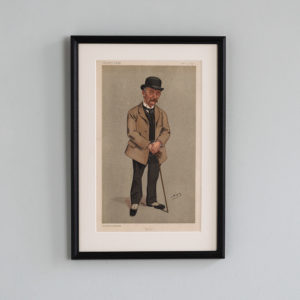
Tess,
£250Tess,
Framed Chromolithograph by Spy (Leslie Ward) depicting Thomas Hardy, novelist author, poet and architect. Writer of controversial and socially engaged novels such as Tess if the D'urbervilles, Jude the Obscure and popular classics such as Far from the Madding Crowd and The Mayor of Casterbridge. He lived to be appointed to the Order of Merit and his ashes are interred in Poets Corner, Westminster Abbey.£250 -
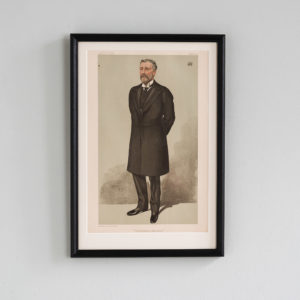
Cricket, Railways, and Agriculture,
£250Cricket, Railways, and Agriculture,
A framed chromolithograph by Spy (Sir Leslie Ward) picturing Charles George Lyttleton, 8th Viscount Cobham, Liberal MP for East Worcestershire. A first class cricketer who played 35 first class matches in his life, he was elected President of the Marylebone Cricket Club in 1888. Cobham was also a member of the Tennis Committee of the MCC and was responsible for framing standardised rules for the new sport of lawn tennis. These unified Laws of Lawn Tennis were published on 29 May 1875.£250 -
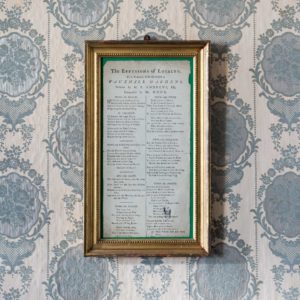
The Effusions of Loyalty, to be performed this evening at Vauxhall Gardens
£240The Effusions of Loyalty, to be performed this evening at Vauxhall Gardens
Written by M.P. Andrews, Esq. and composed by Mr. Hook£240 -
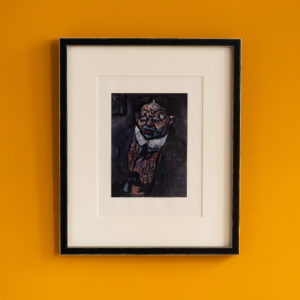
The works of George Roualt. ‘Mr. X’, 1911,
£225The works of George Roualt. ‘Mr. X’, 1911,
Although Georges Rouault a contemporary of Cubism, Expressionism and Fauvism, he never formally associated himself with any of these movements. As an independent he found his inspiration in the realities of everyday life and in religious subjects which he imbued with an authentic spirituality. Early in his career Parisian art dealer, Ambroise Vollard, bought the full contents of Georges Rouault’s studio. The artist agreed on the condition that he could finish his work at his own pace. Most of his works represented circus figures, religious subjects or landscapes.£225 -
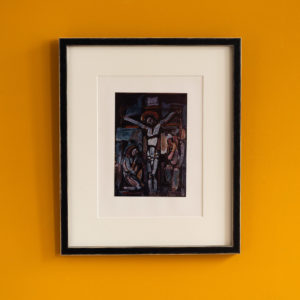
The works of George Roualt. ‘Crucifixion’, c.1918,
£225The works of George Roualt. ‘Crucifixion’, c.1918,
Although Georges Rouault a contemporary of Cubism, Expressionism and Fauvism, he never formally associated himself with any of these movements. As an independent he found his inspiration in the realities of everyday life and in religious subjects which he imbued with an authentic spirituality. Early in his career Parisian art dealer, Ambroise Vollard, bought the full contents of Georges Rouault’s studio. The artist agreed on the condition that he could finish his work at his own pace. Most of his works represented circus figures, religious subjects or landscapes.£225 -

The works of George Roualt. ‘Christ and Two Disciples’, c.1935,
£225The works of George Roualt. ‘Christ and Two Disciples’, c.1935,
Although Georges Rouault a contemporary of Cubism, Expressionism and Fauvism, he never formally associated himself with any of these movements. As an independent he found his inspiration in the realities of everyday life and in religious subjects which he imbued with an authentic spirituality. Early in his career Parisian art dealer, Ambroise Vollard, bought the full contents of Georges Rouault’s studio. The artist agreed on the condition that he could finish his work at his own pace. Most of his works represented circus figures, religious subjects or landscapes.£225 -
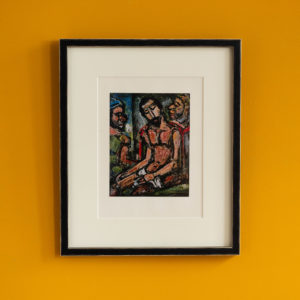
The works of George Roualt. ‘Christ Mocked by Soldiers’, 1932,
£225The works of George Roualt. ‘Christ Mocked by Soldiers’, 1932,
Although Georges Rouault a contemporary of Cubism, Expressionism and Fauvism, he never formally associated himself with any of these movements. As an independent he found his inspiration in the realities of everyday life and in religious subjects which he imbued with an authentic spirituality. Early in his career Parisian art dealer, Ambroise Vollard, bought the full contents of Georges Rouault’s studio. The artist agreed on the condition that he could finish his work at his own pace. Most of his works represented circus figures, religious subjects or landscapes.£225 -
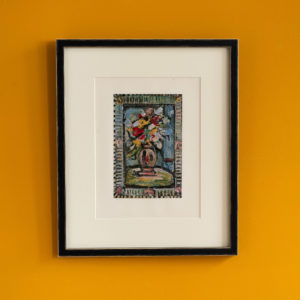
The works of George Roualt. ‘Bouquet’, c.1938,
£225The works of George Roualt. ‘Bouquet’, c.1938,
Although Georges Rouault a contemporary of Cubism, Expressionism and Fauvism, he never formally associated himself with any of these movements. As an independent he found his inspiration in the realities of everyday life and in religious subjects which he imbued with an authentic spirituality. Early in his career Parisian art dealer, Ambroise Vollard, bought the full contents of Georges Rouault’s studio. The artist agreed on the condition that he could finish his work at his own pace. Most of his works represented circus figures, religious subjects or landscapes.£225 -
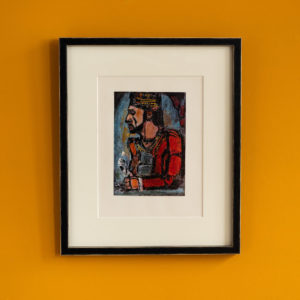
The works of George Roualt. ‘The Old King’, c.1916-36,
£225The works of George Roualt. ‘The Old King’, c.1916-36,
Although Georges Rouault a contemporary of Cubism, Expressionism and Fauvism, he never formally associated himself with any of these movements. As an independent he found his inspiration in the realities of everyday life and in religious subjects which he imbued with an authentic spirituality. Early in his career Parisian art dealer, Ambroise Vollard, bought the full contents of Georges Rouault’s studio. The artist agreed on the condition that he could finish his work at his own pace. Most of his works represented circus figures, religious subjects or landscapes.£225 -
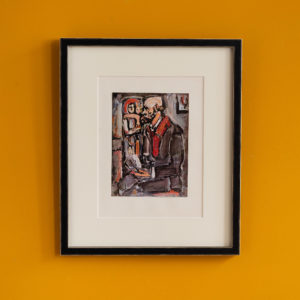
The works of George Roualt. ‘Portrait of Verlaine’, c.1938,
£225The works of George Roualt. ‘Portrait of Verlaine’, c.1938,
Although Georges Rouault a contemporary of Cubism, Expressionism and Fauvism, he never formally associated himself with any of these movements. As an independent he found his inspiration in the realities of everyday life and in religious subjects which he imbued with an authentic spirituality. Early in his career Parisian art dealer, Ambroise Vollard, bought the full contents of Georges Rouault’s studio. The artist agreed on the condition that he could finish his work at his own pace. Most of his works represented circus figures, religious subjects or landscapes.£225 -
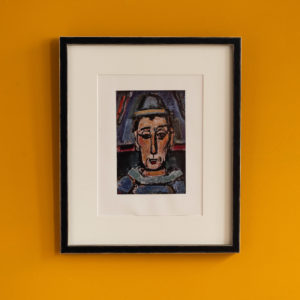
The works of George Roualt. ‘The English Clown’, 1938-39,
£225The works of George Roualt. ‘The English Clown’, 1938-39,
Although Georges Rouault a contemporary of Cubism, Expressionism and Fauvism, he never formally associated himself with any of these movements. As an independent he found his inspiration in the realities of everyday life and in religious subjects which he imbued with an authentic spirituality. Early in his career Parisian art dealer, Ambroise Vollard, bought the full contents of Georges Rouault’s studio. The artist agreed on the condition that he could finish his work at his own pace. Most of his works represented circus figures, religious subjects or landscapes.£225 -
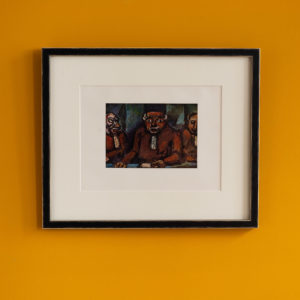
The works of George Roualt. ‘Three Judges’, 1918,
£225The works of George Roualt. ‘Three Judges’, 1918,
Although Georges Rouault a contemporary of Cubism, Expressionism and Fauvism, he never formally associated himself with any of these movements. As an independent he found his inspiration in the realities of everyday life and in religious subjects which he imbued with an authentic spirituality. Early in his career Parisian art dealer, Ambroise Vollard, bought the full contents of Georges Rouault’s studio. The artist agreed on the condition that he could finish his work at his own pace. Most of his works represented circus figures, religious subjects or landscapes.£225 -
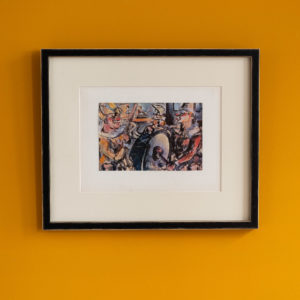
The works of George Roualt. ‘Parade’, 1907,
£225The works of George Roualt. ‘Parade’, 1907,
Although Georges Rouault a contemporary of Cubism, Expressionism and Fauvism, he never formally associated himself with any of these movements. As an independent he found his inspiration in the realities of everyday life and in religious subjects which he imbued with an authentic spirituality. Early in his career Parisian art dealer, Ambroise Vollard, bought the full contents of Georges Rouault’s studio. The artist agreed on the condition that he could finish his work at his own pace. Most of his works represented circus figures, religious subjects or landscapes.£225 -
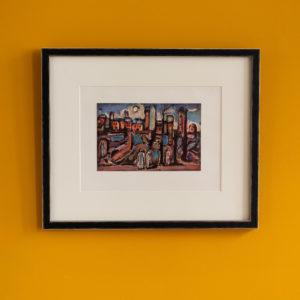
The works of George Roualt. ‘The Humane Landscape’, 1928,
£225The works of George Roualt. ‘The Humane Landscape’, 1928,
Although Georges Rouault a contemporary of Cubism, Expressionism and Fauvism, he never formally associated himself with any of these movements. As an independent he found his inspiration in the realities of everyday life and in religious subjects which he imbued with an authentic spirituality. Early in his career Parisian art dealer, Ambroise Vollard, bought the full contents of Georges Rouault’s studio. The artist agreed on the condition that he could finish his work at his own pace. Most of his works represented circus figures, religious subjects or landscapes.£225 -
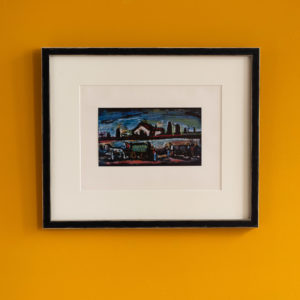
The works of George Roualt. ‘The Funeral’, 1930,
£225The works of George Roualt. ‘The Funeral’, 1930,
Although Georges Rouault a contemporary of Cubism, Expressionism and Fauvism, he never formally associated himself with any of these movements. As an independent he found his inspiration in the realities of everyday life and in religious subjects which he imbued with an authentic spirituality. Early in his career Parisian art dealer, Ambroise Vollard, bought the full contents of Georges Rouault’s studio. The artist agreed on the condition that he could finish his work at his own pace. Most of his works represented circus figures, religious subjects or landscapes.£225 -

The works of George Roualt. ‘Three Clowns’, 1917,
£225The works of George Roualt. ‘Three Clowns’, 1917,
Although Georges Rouault a contemporary of Cubism, Expressionism and Fauvism, he never formally associated himself with any of these movements. As an independent he found his inspiration in the realities of everyday life and in religious subjects which he imbued with an authentic spirituality. Early in his career Parisian art dealer, Ambroise Vollard, bought the full contents of Georges Rouault’s studio. The artist agreed on the condition that he could finish his work at his own pace. Most of his works represented circus figures, religious subjects or landscapes.£225 -
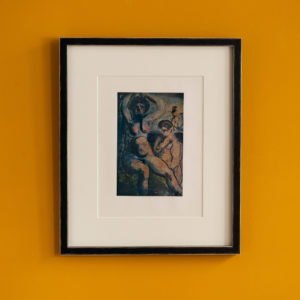
The works of George Roualt. ‘Nudes’, c.1907,
£225The works of George Roualt. ‘Nudes’, c.1907,
Although Georges Rouault a contemporary of Cubism, Expressionism and Fauvism, he never formally associated himself with any of these movements. As an independent he found his inspiration in the realities of everyday life and in religious subjects which he imbued with an authentic spirituality. Early in his career Parisian art dealer, Ambroise Vollard, bought the full contents of Georges Rouault’s studio. The artist agreed on the condition that he could finish his work at his own pace. Most of his works represented circus figures, religious subjects or landscapes.£225 -
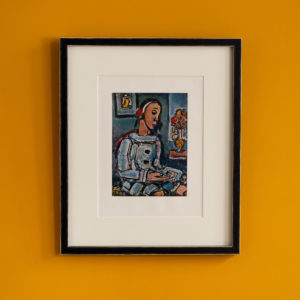
The works of George Roualt. ‘The Wise Pierrot, 1945’,
£225The works of George Roualt. ‘The Wise Pierrot, 1945’,
Although Georges Rouault a contemporary of Cubism, Expressionism and Fauvism, he never formally associated himself with any of these movements. As an independent he found his inspiration in the realities of everyday life and in religious subjects which he imbued with an authentic spirituality. Early in his career Parisian art dealer, Ambroise Vollard, bought the full contents of Georges Rouault’s studio. The artist agreed on the condition that he could finish his work at his own pace. Most of his works represented circus figures, religious subjects or landscapes.£225 -
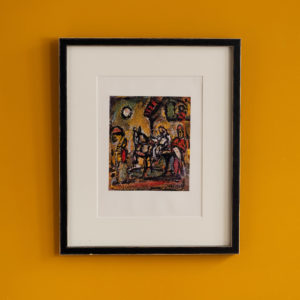
The works of George Roualt. ‘The Flight into Egypt, 1948’,
£225The works of George Roualt. ‘The Flight into Egypt, 1948’,
Although Georges Rouault a contemporary of Cubism, Expressionism and Fauvism, he never formally associated himself with any of these movements. As an independent he found his inspiration in the realities of everyday life and in religious subjects which he imbued with an authentic spirituality. Early in his career Parisian art dealer, Ambroise Vollard, bought the full contents of Georges Rouault’s studio. The artist agreed on the condition that he could finish his work at his own pace. Most of his works represented circus figures, religious subjects or landscapes.£225 -
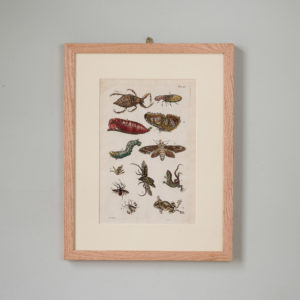
Natural History of Carolina, Florida and the Bahama Islands, published 1729 – 1747.
£225Natural History of Carolina, Florida and the Bahama Islands, published 1729 – 1747.
Mark Catesby was born in Essex to a family owned a farm and house, Holgate, in Sudbury, Suffolk. His acquaintance with the naturalist Reverend John Ray, a leading English naturalist of the late 17th century and co-author of an early classic study on birds started Catesby’s life-long becoming interest in natural history, which he went on to study in London. His life changes when in 1712, he arrived at Williamsburg, Virginia, accompanying his married sister Elizabeth Cocke and two of her children. During his seven-year stay in Virginia that Catesby developed a passionate in the native flora and fauna. He began collecting botanical specimens, especially seeds, and sending them to friends in England and he met William Byrd II, who was an amateur naturalist, a member of the colonial Council and a Fellow of the Royal Society. When he returned to England in 1719, influential members of the Royal Society, then chaired by Sir Isaac Newton, had learned of his work in the colonies. Led by William Sherard, “one of the most celebrated botanists of the age,” members began soliciting sponsors to finance Catesby for a botanical expedition to South Carolina. By 1722, Catesby was again crossing the Atlantic to further his work in the New World. Catesby, was one of the first people to recognize how natural and man-made destruction and depredation of a species’ habitat lead to extinction. He was the first to depict birds, in conjunction with environmentally relevant plants. He returned to England in 1726, and then spent the subsequent two decades years developing his work that would eventually be published as, "The Natural History of Carolina, Florida, and the Bahama Islands" It was first fully illustrated study of the natural history of North America and the most comprehensive to date. Working virtually alone, Catesby personally oversaw every aspect of the work’s production, even learning the difficult art of etching on copper plates. To finance this expensive printing project, Catesby sought subscriptions, offering his book in sections of 20 plates to be published every four months. Published in eleven sections and featuring more than 220 hand-coloured etchings. Published in eleven sections and featuring more than 220 hand-coloured etchings. He personally presented the first section to Her Majesty Queen Caroline in May 1729, and later he dedicated the first volume of the Natural History to her. Following a collapse, Mark Catesby died at his home on Old Street, London, on 23 December 1749, and he was buried in the churchyard of St Luke’s Church£225 -
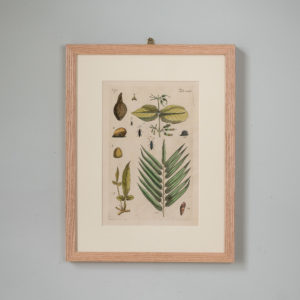
Natural History of Carolina, Florida and the Bahama Islands, published 1729 – 1747.
£225Natural History of Carolina, Florida and the Bahama Islands, published 1729 – 1747.
Mark Catesby was born in Essex to a family owned a farm and house, Holgate, in Sudbury, Suffolk. His acquaintance with the naturalist Reverend John Ray, a leading English naturalist of the late 17th century and co-author of an early classic study on birds started Catesby’s life-long becoming interest in natural history, which he went on to study in London. His life changes when in 1712, he arrived at Williamsburg, Virginia, accompanying his married sister Elizabeth Cocke and two of her children. During his seven-year stay in Virginia that Catesby developed a passionate in the native flora and fauna. He began collecting botanical specimens, especially seeds, and sending them to friends in England and he met William Byrd II, who was an amateur naturalist, a member of the colonial Council and a Fellow of the Royal Society. When he returned to England in 1719, influential members of the Royal Society, then chaired by Sir Isaac Newton, had learned of his work in the colonies. Led by William Sherard, “one of the most celebrated botanists of the age,” members began soliciting sponsors to finance Catesby for a botanical expedition to South Carolina. By 1722, Catesby was again crossing the Atlantic to further his work in the New World. Catesby, was one of the first people to recognize how natural and man-made destruction and depredation of a species’ habitat lead to extinction. He was the first to depict birds, in conjunction with environmentally relevant plants. He returned to England in 1726, and then spent the subsequent two decades years developing his work that would eventually be published as, "The Natural History of Carolina, Florida, and the Bahama Islands" It was first fully illustrated study of the natural history of North America and the most comprehensive to date. Working virtually alone, Catesby personally oversaw every aspect of the work’s production, even learning the difficult art of etching on copper plates. To finance this expensive printing project, Catesby sought subscriptions, offering his book in sections of 20 plates to be published every four months. Published in eleven sections and featuring more than 220 hand-coloured etchings. Published in eleven sections and featuring more than 220 hand-coloured etchings. He personally presented the first section to Her Majesty Queen Caroline in May 1729, and later he dedicated the first volume of the Natural History to her. Following a collapse, Mark Catesby died at his home on Old Street, London, on 23 December 1749, and he was buried in the churchyard of St Luke’s Church£225 -
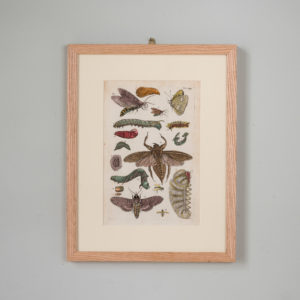
Natural History of Carolina, Florida and the Bahama Islands, published 1729 – 1747.
£225Natural History of Carolina, Florida and the Bahama Islands, published 1729 – 1747.
Mark Catesby was born in Essex to a family owned a farm and house, Holgate, in Sudbury, Suffolk. His acquaintance with the naturalist Reverend John Ray, a leading English naturalist of the late 17th century and co-author of an early classic study on birds started Catesby’s life-long becoming interest in natural history, which he went on to study in London. His life changes when in 1712, he arrived at Williamsburg, Virginia, accompanying his married sister Elizabeth Cocke and two of her children. During his seven-year stay in Virginia that Catesby developed a passionate in the native flora and fauna. He began collecting botanical specimens, especially seeds, and sending them to friends in England and he met William Byrd II, who was an amateur naturalist, a member of the colonial Council and a Fellow of the Royal Society. When he returned to England in 1719, influential members of the Royal Society, then chaired by Sir Isaac Newton, had learned of his work in the colonies. Led by William Sherard, “one of the most celebrated botanists of the age,” members began soliciting sponsors to finance Catesby for a botanical expedition to South Carolina. By 1722, Catesby was again crossing the Atlantic to further his work in the New World. Catesby, was one of the first people to recognize how natural and man-made destruction and depredation of a species’ habitat lead to extinction. He was the first to depict birds, in conjunction with environmentally relevant plants. He returned to England in 1726, and then spent the subsequent two decades years developing his work that would eventually be published as, "The Natural History of Carolina, Florida, and the Bahama Islands" It was first fully illustrated study of the natural history of North America and the most comprehensive to date. Working virtually alone, Catesby personally oversaw every aspect of the work’s production, even learning the difficult art of etching on copper plates. To finance this expensive printing project, Catesby sought subscriptions, offering his book in sections of 20 plates to be published every four months. Published in eleven sections and featuring more than 220 hand-coloured etchings. Published in eleven sections and featuring more than 220 hand-coloured etchings. He personally presented the first section to Her Majesty Queen Caroline in May 1729, and later he dedicated the first volume of the Natural History to her. Following a collapse, Mark Catesby died at his home on Old Street, London, on 23 December 1749, and he was buried in the churchyard of St Luke’s Church£225 -
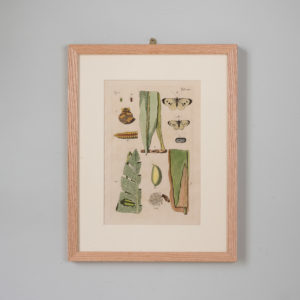
Natural History of Carolina, Florida and the Bahama Islands, published 1729 – 1747.
£225Natural History of Carolina, Florida and the Bahama Islands, published 1729 – 1747.
Mark Catesby was born in Essex to a family owned a farm and house, Holgate, in Sudbury, Suffolk. His acquaintance with the naturalist Reverend John Ray, a leading English naturalist of the late 17th century and co-author of an early classic study on birds started Catesby’s life-long becoming interest in natural history, which he went on to study in London. His life changes when in 1712, he arrived at Williamsburg, Virginia, accompanying his married sister Elizabeth Cocke and two of her children. During his seven-year stay in Virginia that Catesby developed a passionate in the native flora and fauna. He began collecting botanical specimens, especially seeds, and sending them to friends in England and he met William Byrd II, who was an amateur naturalist, a member of the colonial Council and a Fellow of the Royal Society. When he returned to England in 1719, influential members of the Royal Society, then chaired by Sir Isaac Newton, had learned of his work in the colonies. Led by William Sherard, “one of the most celebrated botanists of the age,” members began soliciting sponsors to finance Catesby for a botanical expedition to South Carolina. By 1722, Catesby was again crossing the Atlantic to further his work in the New World. Catesby, was one of the first people to recognize how natural and man-made destruction and depredation of a species’ habitat lead to extinction. He was the first to depict birds, in conjunction with environmentally relevant plants. He returned to England in 1726, and then spent the subsequent two decades years developing his work that would eventually be published as, "The Natural History of Carolina, Florida, and the Bahama Islands" It was first fully illustrated study of the natural history of North America and the most comprehensive to date. Working virtually alone, Catesby personally oversaw every aspect of the work’s production, even learning the difficult art of etching on copper plates. To finance this expensive printing project, Catesby sought subscriptions, offering his book in sections of 20 plates to be published every four months. Published in eleven sections and featuring more than 220 hand-coloured etchings. Published in eleven sections and featuring more than 220 hand-coloured etchings. He personally presented the first section to Her Majesty Queen Caroline in May 1729, and later he dedicated the first volume of the Natural History to her. Following a collapse, Mark Catesby died at his home on Old Street, London, on 23 December 1749, and he was buried in the churchyard of St Luke’s Church£225 -
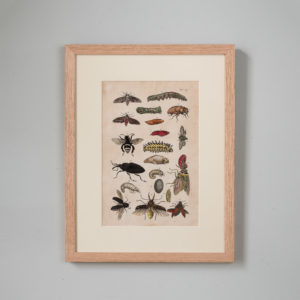
Natural History of Carolina, Florida and the Bahama Islands, published 1729 – 1747.
£225Natural History of Carolina, Florida and the Bahama Islands, published 1729 – 1747.
Mark Catesby was born in Essex to a family owned a farm and house, Holgate, in Sudbury, Suffolk. His acquaintance with the naturalist Reverend John Ray, a leading English naturalist of the late 17th century and co-author of an early classic study on birds started Catesby’s life-long becoming interest in natural history, which he went on to study in London. His life changes when in 1712, he arrived at Williamsburg, Virginia, accompanying his married sister Elizabeth Cocke and two of her children. During his seven-year stay in Virginia that Catesby developed a passionate in the native flora and fauna. He began collecting botanical specimens, especially seeds, and sending them to friends in England and he met William Byrd II, who was an amateur naturalist, a member of the colonial Council and a Fellow of the Royal Society. When he returned to England in 1719, influential members of the Royal Society, then chaired by Sir Isaac Newton, had learned of his work in the colonies. Led by William Sherard, “one of the most celebrated botanists of the age,” members began soliciting sponsors to finance Catesby for a botanical expedition to South Carolina. By 1722, Catesby was again crossing the Atlantic to further his work in the New World. Catesby, was one of the first people to recognize how natural and man-made destruction and depredation of a species’ habitat lead to extinction. He was the first to depict birds, in conjunction with environmentally relevant plants. He returned to England in 1726, and then spent the subsequent two decades years developing his work that would eventually be published as, "The Natural History of Carolina, Florida, and the Bahama Islands" It was first fully illustrated study of the natural history of North America and the most comprehensive to date. Working virtually alone, Catesby personally oversaw every aspect of the work’s production, even learning the difficult art of etching on copper plates. To finance this expensive printing project, Catesby sought subscriptions, offering his book in sections of 20 plates to be published every four months. Published in eleven sections and featuring more than 220 hand-coloured etchings. Published in eleven sections and featuring more than 220 hand-coloured etchings. He personally presented the first section to Her Majesty Queen Caroline in May 1729, and later he dedicated the first volume of the Natural History to her. Following a collapse, Mark Catesby died at his home on Old Street, London, on 23 December 1749, and he was buried in the churchyard of St Luke’s Church£225 -
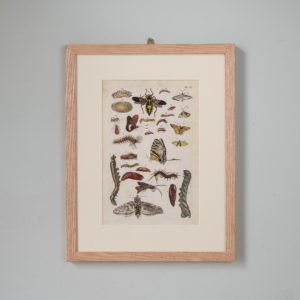
Natural History of Carolina, Florida and the Bahama Islands, published 1729 – 1747.
£225Natural History of Carolina, Florida and the Bahama Islands, published 1729 – 1747.
Mark Catesby was born in Essex to a family owned a farm and house, Holgate, in Sudbury, Suffolk. His acquaintance with the naturalist Reverend John Ray, a leading English naturalist of the late 17th century and co-author of an early classic study on birds started Catesby’s life-long becoming interest in natural history, which he went on to study in London. His life changes when in 1712, he arrived at Williamsburg, Virginia, accompanying his married sister Elizabeth Cocke and two of her children. During his seven-year stay in Virginia that Catesby developed a passionate in the native flora and fauna. He began collecting botanical specimens, especially seeds, and sending them to friends in England and he met William Byrd II, who was an amateur naturalist, a member of the colonial Council and a Fellow of the Royal Society. When he returned to England in 1719, influential members of the Royal Society, then chaired by Sir Isaac Newton, had learned of his work in the colonies. Led by William Sherard, “one of the most celebrated botanists of the age,” members began soliciting sponsors to finance Catesby for a botanical expedition to South Carolina. By 1722, Catesby was again crossing the Atlantic to further his work in the New World. Catesby, was one of the first people to recognize how natural and man-made destruction and depredation of a species’ habitat lead to extinction. He was the first to depict birds, in conjunction with environmentally relevant plants. He returned to England in 1726, and then spent the subsequent two decades years developing his work that would eventually be published as, "The Natural History of Carolina, Florida, and the Bahama Islands" It was first fully illustrated study of the natural history of North America and the most comprehensive to date. Working virtually alone, Catesby personally oversaw every aspect of the work’s production, even learning the difficult art of etching on copper plates. To finance this expensive printing project, Catesby sought subscriptions, offering his book in sections of 20 plates to be published every four months. Published in eleven sections and featuring more than 220 hand-coloured etchings. Published in eleven sections and featuring more than 220 hand-coloured etchings. He personally presented the first section to Her Majesty Queen Caroline in May 1729, and later he dedicated the first volume of the Natural History to her. Following a collapse, Mark Catesby died at his home on Old Street, London, on 23 December 1749, and he was buried in the churchyard of St Luke’s Church£225 -
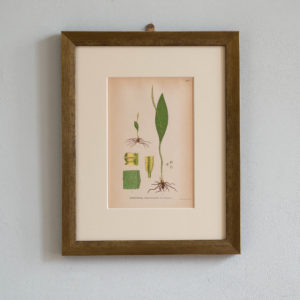
Natural History, Original Fern Prints based on the Work of Carl Lindman. ‘Ophioglossum Vulgatum’.
£220Natural History, Original Fern Prints based on the Work of Carl Lindman. ‘Ophioglossum Vulgatum’.
Carl Axel Magnus Lindman was a Swedish botanist and botanical artist, who published "Bilder ur Nordens Flora" between 1901-1905.£220 -
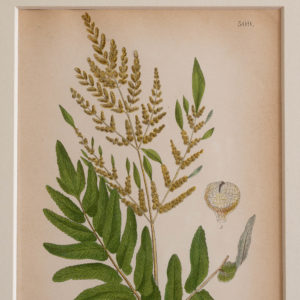
Natural History, Original Fern Prints based on the Work of Carl Lindman. ‘Osmunda Regalis.
£220Natural History, Original Fern Prints based on the Work of Carl Lindman. ‘Osmunda Regalis.
Carl Axel Magnus Lindman was a Swedish botanist and botanical artist, who published "Bilder ur Nordens Flora" between 1901-1905.£220 -
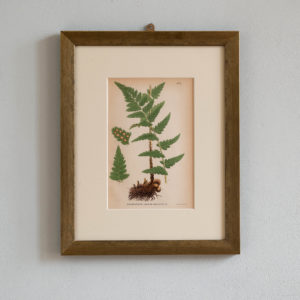
Natural History, Original Fern Prints based on the Work of Carl Lindman. ‘Aspidium Cristatum’,
£220Natural History, Original Fern Prints based on the Work of Carl Lindman. ‘Aspidium Cristatum’,
Carl Axel Magnus Lindman was a Swedish botanist and botanical artist, who published "Bilder ur Nordens Flora" between 1901-1905.£220 -
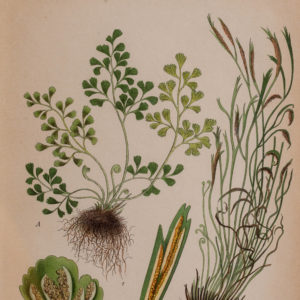
Natural History, Original Fern Prints based on the Work of Carl Lindman. ‘Asplenium Septentrionale’.
£220Natural History, Original Fern Prints based on the Work of Carl Lindman. ‘Asplenium Septentrionale’.
Carl Axel Magnus Lindman was a Swedish botanist and botanical artist, who published "Bilder ur Nordens Flora" between 1901-1905.£220
Featured Items
-
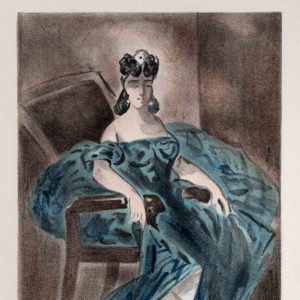
Portraits Part I by Constantin Guys, Verve Vol 2 / No. 5-6.
£500Portraits Part I by Constantin Guys, Verve Vol 2 / No. 5-6.
The Verve Review was a purposefully luxurious. It ran from 1937 to 1960, but with only 38 editions available, due to the high degree of design and editorial work dedicated to each issue. Each edition contained unique lithographic prints, commissioned by the editor, and each cover a double-page lithograph elaborated by one of the artists contained within. It was the brainchild of its editor Stratis Eleftheriades, a Greek National who moved to Paris in the early thirties to take part in the growing Modernist movement, writing under the name of Teriade.£500 -
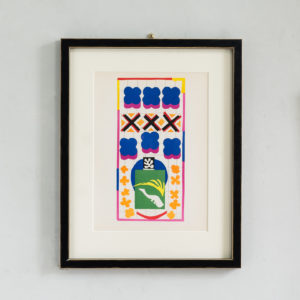
Henri Matisse, ‘The Last Works of Henri Matisse’
£900 eachHenri Matisse, ‘The Last Works of Henri Matisse’
From Verve Vol. IX No. 35/36 published by Tériade under the title 'The Last Works of Henri Matisse'£900 each -
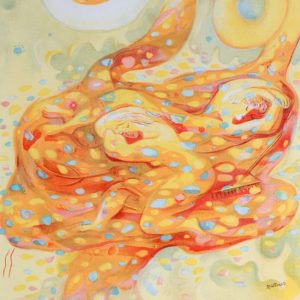
Autumn by Abraham Rattner, Verve Vol. 1 / No. 3.
£600Autumn by Abraham Rattner, Verve Vol. 1 / No. 3.
The Verve Review was a purposefully luxurious. It ran from 1937 to 1960, but with only 38 editions available, due to the high degree of design and editorial work dedicated to each issue. Each edition contained unique lithographic prints, commissioned by the editor, and each cover a double-page lithograph elaborated by one of the artists contained within. It was the brainchild of its editor Stratis Eleftheriades, a Greek National who moved to Paris in the early thirties to take part in the growing Modernist movement, writing under the name of Teriade.£600 -
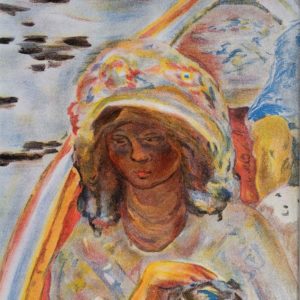
Portrait Fragment by Pierre Bonnard, Verve Vol 2 / No. 5-6.
£600Portrait Fragment by Pierre Bonnard, Verve Vol 2 / No. 5-6.
The Verve Review was a purposefully luxurious. It ran from 1937 to 1960, but with only 38 editions available, due to the high degree of design and editorial work dedicated to each issue. Each edition contained unique lithographic prints, commissioned by the editor, and each cover a double-page lithograph elaborated by one of the artists contained within. It was the brainchild of its editor Stratis Eleftheriades, a Greek National who moved to Paris in the early thirties to take part in the growing Modernist movement, writing under the name of Teriade.£600

